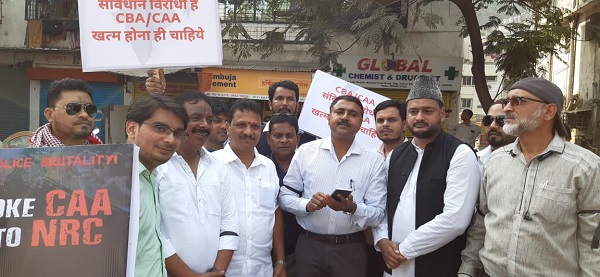
Eyebrows Raised As Registrar Says Questionnaire for NPR Being Finalised

Maharashtra IPS officer Abdur Rahman, posted as special IGP in Mumbai, quits over ‘communal, unconstitutional’ CAB attended Mumbra rally along with Danish Reyaz, Rajan Kine, Zafar Nomani(File Photo)
Activists, who opposed CAA, continuously maintained that NPR was the first step towards the NRC. After gathering information through the NPR, the government can prepare the NRC list on its own
Waquar Hasan | NEW DELHI
The Narendra Modi government seems to be going ahead with its plan for the National Register of Citizen (NRC) despite protests and the pandemic as the office of the Registrar-General of India (RGI) has informed that the questionnaire for National Population Register (NPR), the first step of the NRC, is being finalised.
In an RTI reply to The Hindu, the RGI said the schedule and the questionnaire are being finalised while the information about the expected date of the first phase of Census 2021 is ‘not available’. The exercise of Census 2021 and the update of the NPR were scheduled to be held in April this year but they were postponed indefinitely on March 25 due to the Covid-19 pandemic.
The passage of CAA (Citizenship Amendment Act) in December last year drew massive nationwide protests for exclusion of Muslims from citizenship. The CAA has provisions to grant citizenship to Hindus, Sikhs, Christians, Buddhists, Parsis and Jains from Pakistan, Bangladesh and Afghanistan. Earlier, Home Minister Amit Shah had announced several times that his government would conduct the nationwide NRC and would give citizenship to all the people from these six communities if they fail to make it to the NRC list.
Being discriminatory against Muslims, CAA, along with the NRC-NPR, was opposed by all sections of society. The opposition parties, students in the national universities and Muslims across the country continued their protests since December 2019 till March this year. After the protests, many opposition-ruled states passed resolutions in their states that they would not conduct NRC-NPR.
The Central government started saying that it has no plans for conducting NRC for now. But the activists, who opposed CAA, continuously maintained that NPR was the first step towards the NRC. After gathering information through the NPR, the government can prepare the NRC list on its own.
Sadaf Jafar, one of the political activists who led anti-CAA protests in Lucknow, told Clarion India that if the government came up again with its plan for NPR which is different from the old format of the NPR, they would boycott it. Because, this government’s NPR was trying to segregate people along religious and caste lines. “If there would be the need for protest, we will protest, too,” she said.
“The government is trying to exploit the situation of the Covid-19 pandemic. The government feels that women would not come out in protest amid the pandemic. It thinks that the protests will not be held as it has launched a crackdown against the anti-CAA protesters. Even today, many cases are lodged against me. There is a case of attaching my house for damage recovery. The government tried to break the bone of all anti-CAA protest leaders. They feel that now the protesters will not have courage to hold a sit-in. But the government does not understand that if it will snatch our nationality, what will be left with us? It is better that it shoots all of us,” said Jafar, who was part of the anti-CAA sit-in at Lucknow’s Clock Tower.
Kavita Krishnan, politburo member of CPI-ML, said that the way the government was becoming adamant on this issue, people also needed to be adamant on it in similar vein. People have to vow that they will not show their documents and provide information on this. People from the marginalised sections need to be made aware about it and explain to them how dangerous it is for them.
Krishnan, who was part of anti-CAA protests at several places, said that the government was adamant on this issue because this was a fascist government and it thought that it had the right to decide who would be the citizen of the country and who would not be the citizen.”
Krishnan differed with Jafar’s opinion that the old format of NPR should be allowed to happen. “We have to oppose NPR under all circumstances. If the Congress government had earlier made mistakes, it does not mean we should repeat it. NPR is closely linked with NRC. And the second thing is that when the Congress implemented the NPR, there was no CAA. Today, there is CAA”.
